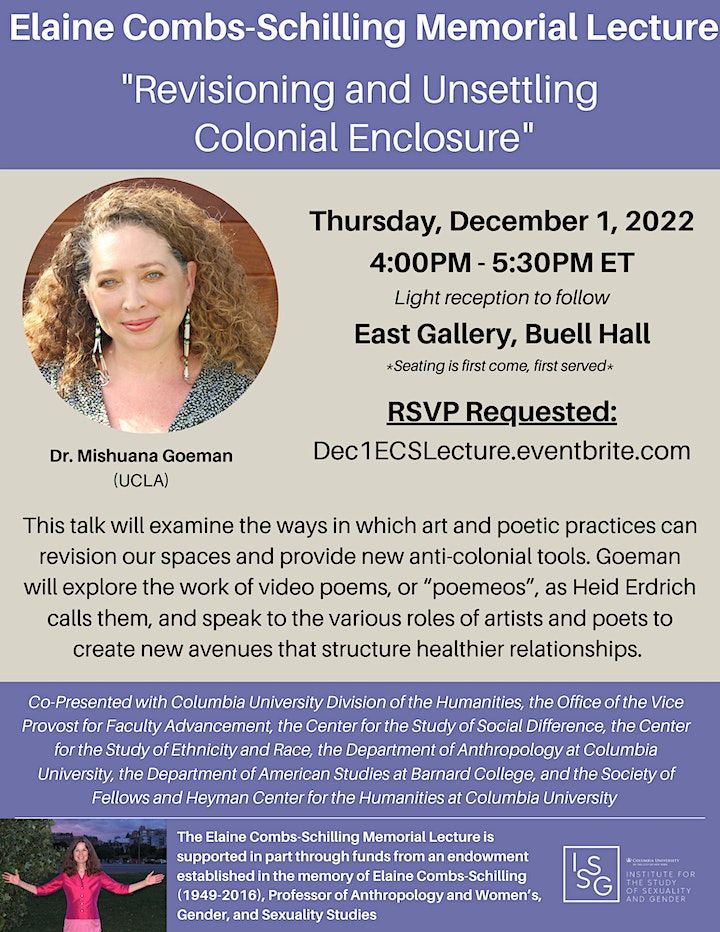
About this Event
About this event
This talk will examine the ways in which art and poetic practices can revision our spaces and provide new anti-colonial tools. Rethinking colonial spatial philosophies must include our mind’s eye so that we can reimagine a just world. Settler environmental control is often invisible in its scaffolding of power—by revisioning we expose its superstructure, and hopefully build new sightlines which account for colonial and racial injustice. Here, Goeman will explore the work of video poems, or “poemeos”, as Heid Erdrich calls them, and speak to the various role of artist and poets to create new avenues that structure healthier relationships.
Co-Presented with Columbia University Division of the Humanities, the Office of the Vice Provost for Faculty Advancement, the Center for the Study of Social Difference, the Center for the Study of Ethnicity and Race, the Department of Anthropology at Columbia University, the Department of American Studies at Barnard College, and the Society of Fellows and Heyman Center for the Humanities at Columbia University
Important Information
Seating is available on a first-come first-served basis, RSVPs do not guarantee admission. All attendees must show either a CU/BC ID (affiliates) or vaccination record (non-affiliate) for entry to the event.
Speaker Bio
Dr. Mishuana Goeman, Tonawanda Band of Seneca, is currently a Professor of Indigenous Studies on leave from UCLA’s Gender Studies and American Indian Studies, as well as an affiliated faculty of Critical Race Studies in the Law School at UCLA. Her monographs include Mark My Words: Native Women Mapping Our Nations (University of Minnesota Press, 2013) and the forthcoming Settler Aesthetics and the Spectacle of Originary Moments: Terrence Malick’s the New World (University of Nebraska Press). She is also part of the feminist editorial collective for Keywords in Gender and Sexuality Studies (NYU Press 2021). Her community-engaged work is devoted to several digital humanities projects, including participation as Co-PI on community-based digital projects, Mapping Indigenous L.A (2015), which gathers alternative maps of resiliency from Indigenous LA communities. Carrying Our Ancestors Home (2019) is a site concentrating on better working tribal relationships and communications as it concerns repatriation and NAGPRA.
She is the PI of the University of California President’s office multi-campus Research Grant for Centering Tribal Stories in Difficult Times. She also headed up the new Mukurtu California Native Hub housed at AISC through an NEH sub-grant, which supports local tribal organizations and nations to start their cultural heritage and language digitally sovereign sites through the Mukurtu platform. She also publishes widely in peer-reviewed journals and books, including guest-edited volumes on Native Feminisms and Indigenous Performances. Her work from 2018-2022 included holding the Inaugural Special Advisor position at UCLA, where she worked across campus to better Indigenous relationships. From 2020-2021 she was a Distinguished Visiting Scholar with the Center for Diversity Innovation at the University at Buffalo, located in her home territories.

Event Venue & Nearby Stays
Buell Hall, 515 West 116th Street, New York, United States
USD 0.00
